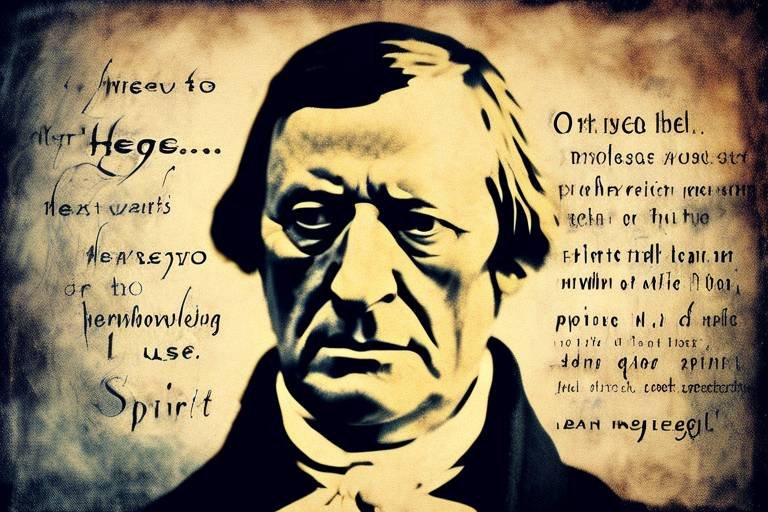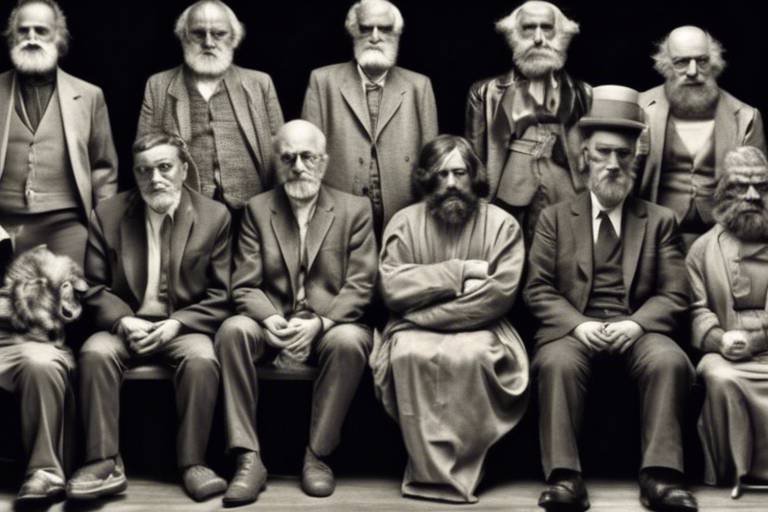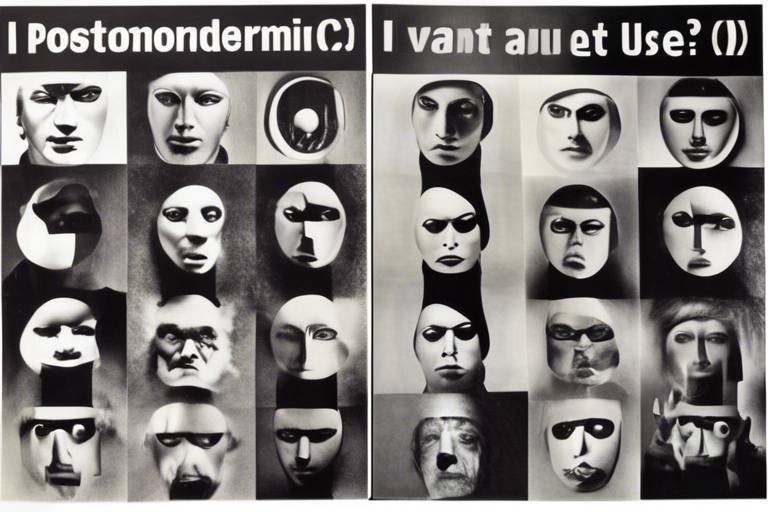Unraveling Hegel's Phenomenology of Spirit
When diving into the depths of Hegel's Phenomenology of Spirit, one might feel like they are embarking on a philosophical rollercoaster—full of twists, turns, and unexpected insights. This remarkable work, published in 1807, is not just a collection of abstract thoughts; it’s a profound exploration of human consciousness, self-awareness, and the very essence of reality. Hegel invites us to join him on a journey that transcends mere understanding, urging us to engage with the fundamental questions of existence. Have you ever pondered what it truly means to be aware of yourself in a world filled with others? Hegel's work challenges us to confront these questions head-on, offering a framework that connects our individual experiences to the larger tapestry of human spirit.
At its core, the Phenomenology is about the evolution of consciousness. It’s like watching a seed grow into a towering tree; each stage of development is crucial for the overall growth of the spirit. Hegel meticulously outlines this progression, starting from basic awareness to the complex interplay of self-consciousness and recognition. As we navigate through his ideas, we begin to see how our understanding of ourselves is deeply intertwined with our interactions with others. It’s a dance of recognition, where we not only see ourselves reflected in others but also realize that our identity is shaped by these encounters.
As we unravel Hegel's intricate web of thought, we find that his dialectical method—characterized by the triad of thesis, antithesis, and synthesis—plays a pivotal role in this exploration. Imagine a conversation where two opposing viewpoints clash, ultimately giving rise to a new understanding that transcends the initial disagreement. This is not just a philosophical exercise; it mirrors the dynamic nature of reality itself. Hegel's dialectics remind us that conflict can be a catalyst for growth, both in our personal lives and in the broader context of history.
The implications of Hegel's work stretch far beyond the pages of his book. His ideas have influenced a multitude of fields, from politics to art and psychology. Think about it: how often do we see the interplay of ideas shaping societal progress? Hegel's exploration of consciousness and identity has paved the way for modern discussions around existentialism, Marxism, and critical theory. Even today, his thoughts resonate with contemporary debates on what it means to be human in an ever-changing world.
By engaging with Hegel's Phenomenology, we not only gain insight into his philosophical project but also embark on a journey of self-discovery. It prompts us to ask ourselves: Who am I? How do I relate to others? And what does it mean to be a part of something greater than myself? These questions are not merely academic; they are deeply personal and resonate with our everyday experiences. So, as we delve deeper into Hegel's thoughts, let’s keep an open mind and a curious heart, ready to embrace the complexity and richness of human consciousness.
- What is the main idea of Hegel's Phenomenology of Spirit?
The main idea revolves around the development of consciousness and self-awareness through dialectical processes, emphasizing the interconnectedness of individual experiences. - How does Hegel's dialectical method work?
Hegel's dialectical method involves a triadic structure: thesis (an idea), antithesis (the contradiction of that idea), and synthesis (the resolution that incorporates both). This process illustrates the evolution of thought and understanding. - Why is recognition important in Hegel's philosophy?
Recognition is crucial as it highlights how individuals achieve self-awareness through their interactions with others, demonstrating the social dimension of identity formation. - What impact has Hegel's work had on modern philosophy?
Hegel's Phenomenology has significantly influenced various philosophical movements, including existentialism, Marxism, and critical theory, shaping contemporary discussions on consciousness and identity.

The Historical Context of Hegel's Work
To truly appreciate the depth of Hegel's Phenomenology of Spirit, we must first delve into the historical context that shaped his thoughts. Born in 1770, Hegel was a product of the tumultuous era of the late 18th and early 19th centuries, a time marked by revolutionary ideas and profound social change. The Enlightenment had paved the way for a new understanding of reason, individualism, and freedom, yet it was also a period rife with conflict, particularly in Europe. The French Revolution, which began in 1789, not only inspired hope for democratic governance but also unleashed chaos and violence, leading to a reevaluation of the role of the state and the individual.
Hegel's philosophy cannot be separated from the currents of German Idealism, which sought to transcend the limitations of empirical thought by emphasizing the role of the mind in shaping reality. Thinkers like Kant, Fichte, and Schelling laid the groundwork for Hegel's ideas, each contributing to a growing emphasis on the subjective experience of consciousness. For Hegel, this was not merely an intellectual exercise; it was a means to understand the evolution of human consciousness and the unfolding of the Absolute Spirit.
During this period, the Industrial Revolution was also gaining momentum, transforming economies and societies. The rise of capitalism led to new social classes and relationships, challenging traditional structures and prompting philosophical inquiries into the nature of freedom, labor, and community. Hegel's work reflects these shifts, as he grappled with the implications of modernity on individual identity and social existence.
Moreover, the Romantic Movement was influencing various disciplines, including philosophy, literature, and the arts. This movement emphasized emotion, nature, and the individual's connection to the larger universe, which resonated with Hegel's ideas about the development of spirit. In this context, Hegel's dialectical method emerged as a way to reconcile the tension between individual freedom and social order, offering a framework for understanding the complexities of human experience.
In summary, the historical backdrop of Hegel's work is essential for grasping the significance of his ideas. The interplay of revolutionary thought, the impact of the Industrial Revolution, and the influence of Romanticism all contribute to the richness of Hegel's philosophical project. As we explore the key themes in the Phenomenology of Spirit, it becomes clear how these historical currents shaped Hegel's understanding of consciousness, self-consciousness, and the development of spirit.
- What is the significance of Hegel's Phenomenology of Spirit?
Hegel's work is significant for its exploration of consciousness and self-consciousness, and its impact on various fields such as philosophy, politics, and psychology.
- How did the historical context influence Hegel's philosophy?
The socio-political changes during Hegel's time, including the French Revolution and the rise of German Idealism, deeply influenced his thoughts on freedom and the development of spirit.
- What are the key themes in Hegel's Phenomenology?
Key themes include consciousness, self-consciousness, recognition, and the dialectical process of thesis, antithesis, and synthesis.

Key Themes in the Phenomenology
Hegel's Phenomenology of Spirit is a rich tapestry of ideas that delve into the nature of consciousness, self-consciousness, and the evolution of spirit. Each theme is intricately woven, creating a profound narrative that challenges our understanding of reality and existence. At its core, this work is not just a philosophical treatise; it’s an exploration of the human experience itself. By dissecting these key themes, we can uncover the layers of meaning that Hegel intended to convey.
One of the most striking aspects of Hegel's work is the emphasis on consciousness. In the beginning, consciousness represents the awareness of both the self and the external world. It’s like the first light of dawn breaking through the darkness, illuminating the path for deeper understanding. Hegel categorizes consciousness into various stages, each contributing to the overall development of knowledge and reality. For instance, he distinguishes between sense-certainty—the most basic form of knowing, where one is aware of immediate sensations—and perception, which allows for a more complex understanding of objects and their properties. This progression is essential, as it sets the stage for the transition to self-consciousness.
As we move from consciousness to self-consciousness, a pivotal transformation occurs. This shift marks a significant moment in Hegelian philosophy, as individuals begin to recognize not only their own identities but also their relationships with others. It’s akin to stepping back from a mirror and realizing that the reflection is not just an image but a representation of one’s essence. In this stage, self-awareness becomes intertwined with the concept of recognition. Hegel posits that true self-consciousness is achieved through social interaction—our identities are shaped and validated by how others perceive and acknowledge us. This idea underscores the inherently social nature of human existence, emphasizing that we are not isolated beings but rather part of a larger community.
Moreover, Hegel’s exploration of the development of spirit is a journey through various forms of consciousness, leading to higher levels of understanding. Each stage of consciousness is not merely a step but a transformation that builds upon the previous one, illustrating a dialectical process. This process is vital to grasping how Hegel views the evolution of ideas and consciousness itself. As we engage with these themes, we begin to see the interconnectedness of our experiences, the way our thoughts evolve, and how they influence our understanding of the world around us.
In summary, the key themes in Hegel's Phenomenology of Spirit—consciousness, self-consciousness, and the development of spirit—are essential for understanding his philosophical project. They challenge us to reconsider our perceptions of reality and identity, urging us to acknowledge the complex interplay between individual awareness and the social fabric that surrounds us. This profound inquiry not only enriches our understanding of philosophy but also invites us to reflect on our own experiences and the nature of our existence.

The Role of Consciousness
Consciousness is the gateway to understanding Hegel's Phenomenology of Spirit. It is like the first ray of sunlight breaking through the clouds, illuminating the vast landscape of human experience. In Hegel's view, consciousness represents the initial awareness of both the self and the external world, acting as the foundation upon which deeper knowledge and reality can be explored. Imagine standing at the edge of a vast ocean; the surface is calm, but beneath lies a world of complexity and depth. This metaphor captures how consciousness serves as the surface level of awareness, while the deeper currents of understanding remain hidden, waiting to be discovered.
Hegel categorizes consciousness into different levels, each contributing uniquely to our evolution as aware beings. At the most basic level, we encounter what he calls sense-certainty, where individuals recognize objects purely through sensory experience. This might be likened to a child seeing a red ball for the first time, captivated by its color and shape, yet unaware of its significance or relation to other objects. As we progress, we transition to perception, where we start to understand the qualities of objects and their relationships. It's akin to learning that the red ball can bounce, roll, or be thrown, thereby expanding our understanding of its properties and our interaction with it.
This journey through consciousness is not merely a linear path; rather, it is a dynamic process that reflects our growing awareness. Hegel emphasizes that each stage of consciousness is vital, as they build upon one another, leading to a more profound understanding of reality. The exploration of consciousness, therefore, is not just an individual endeavor; it is a collective journey that shapes our societal interactions and our shared understanding of existence.
As we delve deeper, we encounter the pivotal transition from consciousness to self-consciousness. This shift marks a significant moment in Hegel's philosophy, akin to a caterpillar transforming into a butterfly. It symbolizes the awakening of the individual to their own identity and their relationship with others. Self-consciousness is not merely about being aware of oneself but involves recognizing oneself through the eyes of others. It’s like a mirror reflecting back our essence, shaped by our interactions and relationships. This social dimension is crucial, as it highlights that our understanding of who we are is deeply intertwined with how others perceive us.
In summary, the role of consciousness in Hegel's framework is foundational and multifaceted. It initiates our journey into understanding reality, evolves through various stages, and ultimately leads us to self-awareness and recognition in the social context. Just as a tree grows from a tiny seed into a towering presence, so too does consciousness expand from basic awareness to a complex, interconnected understanding of self and society.
- What is consciousness according to Hegel?
In Hegel's philosophy, consciousness is the initial awareness of both the self and the external world, serving as the foundation for deeper understanding.
- How does consciousness evolve in Hegel's thought?
Consciousness evolves through different levels, starting with sense-certainty and progressing to perception, ultimately leading to self-consciousness.
- What is the significance of self-consciousness?
Self-consciousness marks a pivotal transition in Hegel's philosophy, where individuals become aware of their identity and their relationship with others.

Levels of Consciousness
In Hegel's exploration of consciousness, he meticulously outlines various levels that illustrate the evolution of human awareness. This journey begins with the most basic form of consciousness, which Hegel refers to as sense-certainty. At this stage, individuals are primarily aware of their immediate sensory experiences. Imagine standing on a beach, feeling the warm sand beneath your feet and the cool breeze against your skin. This is a pure, unmediated experience of reality. However, as we delve deeper, we encounter the next level: perception.
Perception allows individuals to move beyond mere sensory data, encouraging them to synthesize and interpret these experiences. It’s like looking at a beautiful painting; at first, you might just see colors and shapes, but upon closer examination, you start to recognize forms, emotions, and even narratives. This level of consciousness represents a significant leap, as it requires a more complex engagement with the world.
Hegel doesn't stop there; he introduces us to even more intricate levels of consciousness, each building upon the last. To illustrate this progression, consider the following table that summarizes the key stages:
| Level of Consciousness | Description |
|---|---|
| Sense-Certainty | Basic awareness of immediate sensory experiences. |
| Perception | Recognition and interpretation of sensory data. |
| Self-Consciousness | Aware of oneself as a distinct entity, recognizing the self in relation to others. |
As we progress to the level of self-consciousness, a pivotal transformation occurs. Here, individuals begin to recognize their own identity and existence in relation to others. This is a crucial moment in Hegel's philosophy, as it signifies a shift from being a passive observer to becoming an active participant in the social fabric of life. Think of it as the moment when you realize that you are not just a spectator in your own life story, but rather the author, shaping your narrative through interactions with others.
This transition is not merely a personal journey; it is profoundly social. Our self-awareness is intricately linked to how we perceive ourselves through the eyes of others. This interplay of recognition is vital, as it underscores the importance of relationships and social dynamics in the development of consciousness. Without this recognition, our understanding of self remains fragmented and incomplete. Hegel's exploration of these levels serves as a reminder that consciousness is not a static state but a dynamic and evolving process.
In summary, Hegel's levels of consciousness encapsulate a journey from mere sensory experience to profound self-awareness, highlighting the complexity of human existence. This progression is not just philosophical; it resonates deeply with our everyday experiences, reminding us that our understanding of the world and ourselves is always in flux, constantly shaped by our interactions and reflections.
- What is sense-certainty in Hegel's philosophy? Sense-certainty is the initial level of consciousness where individuals are aware only of their immediate sensory experiences.
- How does perception differ from sense-certainty? Perception involves interpreting and synthesizing sensory data, moving beyond mere awareness to understanding.
- Why is self-consciousness important in Hegel's framework? Self-consciousness marks a significant shift in awareness, allowing individuals to recognize their identity in relation to others.

Transition to Self-Consciousness
The transition from consciousness to self-consciousness in Hegel's Phenomenology of Spirit is not just a mere shift; it is a profound metamorphosis that reveals the intricate layers of human identity. Imagine consciousness as a blank canvas, where the individual perceives the world around them. However, as one begins to reflect on their own existence, that canvas transforms into a vibrant tapestry of self-awareness, colored by interactions and relationships. This transition marks a pivotal moment in Hegel's philosophy, emphasizing that self-consciousness is not solely an individual pursuit but a social phenomenon.
In this stage, the individual becomes aware not only of their own thoughts and feelings but also of how they are perceived by others. The realization that one is an object of perception for others leads to a deeper understanding of oneself. It's akin to standing in front of a mirror that reflects not just your physical appearance but also the emotions and thoughts that shape your identity. This dynamic interplay between self and other is crucial, as it highlights the importance of recognition in the development of self-consciousness.
Hegel posits that self-consciousness emerges through a dialectical relationship with others. When individuals recognize each other, they validate one another's existence, creating a mutual acknowledgment that is essential for self-identity. This recognition is not just a passive acknowledgment; it is an active engagement that fosters a sense of belonging and community. Without this recognition, self-consciousness remains fragmented and incomplete.
To illustrate this transition, consider the following key aspects:
- Awareness of Self: The individual begins to see themselves as a distinct entity, separate from the external world.
- Interpersonal Relationships: Engagement with others becomes fundamental, as these interactions shape one's understanding of self.
- Recognition: Achieving self-consciousness is contingent upon being recognized by others, which fosters a sense of identity.
Ultimately, this transition to self-consciousness is a journey towards understanding one's place in the world. It is a dynamic process that reflects the complexities of human relationships and the social fabric that binds us together. Hegel's insights into this transition challenge us to consider how our identities are formed and reformed in the context of our interactions with others. The path to self-consciousness is not a solitary one; it is a shared experience that resonates through the collective consciousness of humanity.
- What is the significance of self-consciousness in Hegel's philosophy?
Self-consciousness is crucial as it marks the individual's awareness of their identity and their relationship with others, emphasizing the social nature of human existence. - How does recognition play a role in self-consciousness?
Recognition from others is essential for self-consciousness, as it validates an individual's existence and fosters a sense of belonging. - Can self-consciousness exist without social interactions?
No, Hegel argues that self-consciousness is inherently relational and cannot fully develop in isolation.

Self-Consciousness and Recognition
In Hegel's Phenomenology of Spirit, the concept of self-consciousness is a cornerstone that reveals the intricate dance between the individual and the collective. You might wonder, what exactly does self-consciousness mean in this context? Well, think of it as the moment when you realize not just that you exist, but that you exist in relation to others. This realization is not merely a solitary epiphany; it is a profound acknowledgment that your identity is shaped by interactions with other people. It's like looking into a mirror and seeing not just your reflection, but also the world around you that defines who you are.
Hegel emphasizes that self-consciousness is achieved through recognition. This means that we become aware of ourselves as individuals only when others recognize us. Imagine you’re at a party, and someone calls your name. In that instant, you feel seen, validated, and your sense of self is heightened. This interaction is crucial; it highlights the social dimension of our existence. Without the acknowledgment of others, our self-awareness remains incomplete. The need for recognition is so fundamental that it drives many of our actions and relationships.
Furthermore, Hegel presents a fascinating dynamic in the struggle for recognition. This struggle can lead to conflict, as individuals seek acknowledgment from each other, often leading to a clash of wills. Picture two people vying for the same title or the same affection. In this scenario, each person’s self-consciousness is at stake. They want to be recognized not just as individuals but as superior beings in their own right. This tension is not merely destructive; it propels individuals toward a greater understanding of themselves and their place in the world.
To illustrate this concept, let’s consider a simple table that summarizes the relationship between self-consciousness and recognition:
| Aspect | Description |
|---|---|
| Self-Consciousness | The awareness of oneself as an individual, distinct from others. |
| Recognition | Acknowledgment from others that validates one’s identity and existence. |
| Struggle for Recognition | The conflict that arises when individuals seek acknowledgment, leading to personal growth. |
Ultimately, Hegel's exploration of self-consciousness and recognition invites us to reflect on our own lives. How often do we seek validation from others? How does this quest shape our identities? It’s a reminder that while we may strive for independence, our sense of self is deeply intertwined with the relationships we cultivate. In a world that often feels fragmented, understanding this connection can lead to richer, more fulfilling interactions. So, the next time you find yourself in a social setting, remember: each acknowledgment is a thread that weaves the fabric of our collective consciousness.
- What is self-consciousness in Hegel's philosophy?
Self-consciousness refers to the awareness of oneself as an individual, which is shaped significantly through interactions with others.
- How does recognition relate to self-consciousness?
Recognition is essential for self-consciousness; we become aware of ourselves through the acknowledgment we receive from others.
- What role does conflict play in the struggle for recognition?
Conflict can arise when individuals seek acknowledgment from one another, but this struggle ultimately leads to personal growth and a deeper understanding of self.

The Dialectical Method
Hegel's approach to philosophy is often summarized by his dialectical method, a dynamic process that illustrates the evolution of ideas and reality. This method is not just a technique but a way of understanding the world that reflects the complexities of human thought and experience. At its core, the dialectical method is about the interplay of contrasting ideas, leading to a synthesis that transcends and reconciles the initial conflict. Picture it like a dance: two partners (thesis and antithesis) move together, sometimes in opposition, but ultimately creating a new rhythm (synthesis) that is richer and more profound.
Hegel's dialectical method can be broken down into three main components: thesis, antithesis, and synthesis. Each component plays a crucial role in the development of thought:
| Component | Description |
|---|---|
| Thesis | The initial idea or proposition that presents a certain viewpoint. |
| Antithesis | The counter-argument or opposing idea that challenges the thesis. |
| Synthesis | The resolution that reconciles the conflict between thesis and antithesis, leading to a higher understanding. |
This triadic structure is not merely academic; it reflects the dynamic nature of reality. For instance, consider how societal changes often arise from conflicting ideologies. A prevailing social norm (thesis) might be challenged by a revolutionary movement (antithesis), ultimately leading to new societal values (synthesis). Hegel's dialectical method thus serves as a powerful lens through which we can view not only philosophical ideas but also historical progress and social evolution.
Moreover, the implications of Hegel's dialectical process extend far beyond the realm of philosophy. It has influenced various fields, including:
- Politics: The dialectical method helps in understanding political revolutions and the development of political theories.
- Art: Artists often grapple with conflicting themes, leading to new forms of expression that reflect deeper truths.
- Psychology: The interplay of conscious and unconscious thoughts can be viewed through a dialectical lens, revealing the complexities of human behavior.
In essence, Hegel’s dialectical method is a reminder that progress is often born out of conflict and resolution. It encourages us to embrace contradictions and view them as opportunities for growth and deeper understanding. Just as in life, where we often face challenges that force us to reevaluate our beliefs and assumptions, Hegel invites us to see this process as essential to the unfolding of our own spirit.
What is the dialectical method?
The dialectical method is a philosophical approach that emphasizes the development of ideas through the interaction of opposing concepts, leading to a synthesis that enhances understanding.
How does Hegel's dialectical method differ from traditional logic?
Traditional logic often focuses on static truths, whereas Hegel's dialectical method acknowledges that truths evolve through conflict and resolution, reflecting the dynamic nature of reality.
Can the dialectical method be applied outside philosophy?
Absolutely! Hegel's dialectical method has influenced various fields, including politics, art, and psychology, highlighting the interconnectedness of ideas and experiences.

Thesis, Antithesis, and Synthesis
The dialectical triad of thesis, antithesis, and synthesis is at the core of Hegel's philosophical framework. This dynamic process serves as a method for understanding the evolution of ideas and reality itself. Imagine a conversation where two people hold opposing views; through dialogue, they might uncover a deeper truth that neither initially recognized. This is the essence of Hegel's dialectic. The thesis represents an initial idea or position, the antithesis counters it with an opposing idea, and through their interaction, they resolve into a higher understanding known as the synthesis.
To break it down further, consider the following example:
| Stage | Description |
|---|---|
| Thesis | The initial proposition or idea. |
| Antithesis | The direct contradiction or opposing idea. |
| Synthesis | The resolution that reconciles the two, leading to a new understanding. |
Hegel believed that this process is not just a philosophical tool but a reflection of the way progress occurs in history and thought. The synthesis does not merely negate the thesis; instead, it incorporates elements of both the thesis and antithesis, creating a more comprehensive understanding. This is why Hegel's dialectic is often viewed as a spiral, where each cycle of thesis-antithesis-synthesis leads to a more advanced stage of consciousness and knowledge.
Moreover, this dialectical method has profound implications beyond philosophy. It influences various fields such as politics, art, and psychology. For instance, in politics, conflicting ideologies can lead to new political systems that better reflect the needs of society. In art, contrasting styles can inspire innovative movements that redefine aesthetic values. Hegel's dialectic encourages us to view conflict not as a dead end but as a necessary step toward growth and evolution.
In summary, the interplay of thesis, antithesis, and synthesis illustrates Hegel's view of reality as a dynamic process. It emphasizes that understanding is not static but continually evolving, shaped by the tensions and resolutions that arise from conflicting ideas. This perspective invites us to embrace complexity and to see the potential for growth in every disagreement and challenge we encounter.

Implications of the Dialectical Process
This article explores the complexities of Hegel's Phenomenology of Spirit, examining its key themes, historical context, and philosophical implications, along with its influence on modern thought.
Understanding the historical backdrop of Hegel's philosophy is crucial for grasping the significance of his ideas, particularly in relation to German Idealism and the socio-political climate of the early 19th century.
Hegel's Phenomenology of Spirit presents several key themes, including consciousness, self-consciousness, and the development of spirit, which are essential for understanding his philosophical project and its implications for human experience.
Consciousness serves as the starting point in Hegel's Phenomenology, representing the initial awareness of the self and the world, which sets the stage for deeper exploration of knowledge and reality.
Hegel distinguishes between different levels of consciousness, such as sense-certainty and perception, illustrating how each stage contributes to the evolution of understanding and self-awareness.
The transition from consciousness to self-consciousness is pivotal in Hegel's thought, marking a significant shift in the individual's awareness of their own identity and relation to others.
Self-consciousness is intimately tied to the concept of recognition, where individuals achieve self-awareness through their interactions with others, highlighting the social dimension of Hegel's philosophy.
Hegel employs a dialectical method to explore the unfolding of spirit, characterized by thesis, antithesis, and synthesis, which reveals the dynamic nature of reality and the development of ideas.
The dialectical triad of thesis, antithesis, and synthesis illustrates how conflicting ideas can lead to higher forms of understanding, showcasing Hegel's view of progress in thought and history.
The implications of Hegel's dialectical process extend far beyond the realm of philosophy; they resonate through various disciplines and spheres of human activity. This dynamic interplay of ideas not only shapes our understanding of philosophical concepts but also influences practical applications in fields like politics, art, and psychology. By recognizing the interconnectedness of development and change, we can appreciate how Hegel's dialectical method provides a framework for addressing complex societal issues.
For instance, in politics, the dialectical method can be seen in the evolution of political ideologies. Conflicting views often lead to new political movements that synthesize elements from both sides, creating a more comprehensive understanding of governance. This process encourages a continuous reevaluation of societal norms and policies, fostering progress.
In the realm of art, Hegel's dialectics can be observed in the evolution of artistic movements. Each new artistic expression often arises as a reaction to the previous one, creating a dialogue that enriches the cultural landscape. This ongoing exchange of ideas leads to innovative forms of expression that reflect the complexities of human experience.
Moreover, in psychology, the dialectical process sheds light on the development of self-identity. Individuals often grapple with conflicting desires and societal expectations, leading to personal growth and a deeper understanding of oneself. This journey mirrors Hegel's notion of self-consciousness, where recognition from others plays a crucial role in shaping our identity.
Ultimately, Hegel's dialectical method encourages us to embrace complexity and contradiction as essential components of progress. By recognizing that conflict can lead to synthesis, we can better navigate the challenges of modern life and foster a deeper understanding of our interconnected existence.
Hegel's Phenomenology of Spirit has had a profound impact on subsequent philosophical thought, shaping existentialism, Marxism, and critical theory, while continuing to inspire contemporary debates on consciousness and identity.
- What is Hegel's Phenomenology of Spirit?
It is a philosophical work that explores the development of consciousness and self-awareness through a dialectical process. - What are the key themes in Hegel's work?
Key themes include consciousness, self-consciousness, recognition, and the dialectical method. - How has Hegel influenced modern thought?
His ideas have significantly impacted existentialism, Marxism, and critical theory, shaping contemporary discussions on identity and consciousness. - What is the dialectical method?
It is a process of thesis, antithesis, and synthesis that illustrates how conflicting ideas can lead to higher understanding and progress.

The Impact of Hegel's Philosophy
Hegel's Phenomenology of Spirit has left an indelible mark on the landscape of philosophical thought, acting as a catalyst for the development of numerous schools of thought. His intricate exploration of consciousness and self-awareness has sparked discussions that resonate even today, influencing a diverse array of disciplines. For instance, existentialists have drawn upon Hegel's ideas to delve into the nature of being and the individual's struggle for meaning. Thinkers like Søren Kierkegaard and Jean-Paul Sartre were particularly inspired by Hegel's emphasis on self-consciousness and the recognition of the other, which they adapted to articulate their own existential concerns.
Moreover, the impact of Hegel's dialectical method cannot be overstated. His framework of thesis, antithesis, and synthesis has been instrumental in shaping various political and social theories. Karl Marx, for example, transformed Hegelian dialectics into a materialist framework, leading to the development of Marxism. By applying Hegel's dialectical approach to the analysis of class struggles and societal changes, Marx provided a revolutionary lens through which to view history and politics. This reinterpretation highlights how Hegel's work transcends mere philosophy, becoming a tool for social critique and activism.
In addition to politics, Hegel's influence extends to the realms of art and psychology. His notion of the development of spirit has inspired artists to explore the evolution of human consciousness through various mediums. The Romantic movement, for instance, can be seen as a response to Hegelian ideas, emphasizing individual experience, emotion, and the sublime. Similarly, in psychology, Hegel's insights into self-consciousness have paved the way for later thinkers like Sigmund Freud and Carl Jung, who examined the complexities of identity and the unconscious mind.
Hegel's work also remains pivotal in contemporary debates surrounding consciousness and identity. In an age where the nature of the self is increasingly scrutinized, Hegel's exploration of self-consciousness and recognition offers a profound framework for understanding personal and collective identity. His assertion that we become who we are through our interactions with others resonates deeply in today's interconnected world, where social media and global communication shape our self-perception.
To illustrate Hegel's far-reaching influence, consider the following table that summarizes key philosophical movements and figures impacted by his ideas:
| Philosophical Movement | Key Figures | Influence |
|---|---|---|
| Existentialism | Kierkegaard, Sartre | Focus on individual existence and self-awareness |
| Marxism | Marx, Engels | Materialist interpretation of dialectics and class struggle |
| Romanticism | Goethe, Schiller | Emphasis on emotion, nature, and the sublime |
| Psychology | Freud, Jung | Exploration of identity and the unconscious mind |
In conclusion, Hegel's Phenomenology of Spirit has not only shaped the trajectory of philosophy but has also permeated various fields, offering rich insights into the human experience. His ideas continue to inspire and challenge us, urging us to reflect on our own consciousness and the intricate dance of recognition that defines our interactions with others. As we navigate the complexities of modern life, Hegel's legacy remains a vital part of our intellectual heritage.
- What is the main focus of Hegel's Phenomenology of Spirit?
Hegel's work primarily explores the development of consciousness and self-consciousness, examining how individuals come to understand themselves and their place in the world through a dialectical process. - How did Hegel influence Marxism?
Marx adapted Hegel's dialectical method to analyze class struggles and social change, transforming it into a materialist framework that emphasized economic and social factors. - What role does recognition play in Hegel's philosophy?
Recognition is essential for self-consciousness; individuals achieve self-awareness through their interactions with others, highlighting the social dimension of identity.
Frequently Asked Questions
- What is Hegel's Phenomenology of Spirit about?
Hegel's Phenomenology of Spirit is a philosophical work that explores the development of consciousness and self-awareness. It delves into how individuals evolve in their understanding of themselves and the world around them through a dialectical process, revealing the complex interplay between consciousness, self-consciousness, and recognition.
- Why is the historical context important for understanding Hegel's work?
The historical context is crucial as it situates Hegel's ideas within the framework of German Idealism and the socio-political landscape of the early 19th century. Understanding the events and intellectual climate of his time helps illuminate how his thoughts addressed contemporary issues and contributed to philosophical discourse.
- What are the key themes in Hegel's Phenomenology?
Some of the key themes include consciousness, self-consciousness, and the development of spirit. These themes are essential for grasping Hegel's philosophical project, as they highlight the evolution of human experience and the importance of social interactions in achieving self-awareness.
- How does Hegel define consciousness?
In Hegel's framework, consciousness represents the initial awareness of the self and the external world. It serves as the foundation for deeper exploration of knowledge and reality, leading to various levels of understanding that contribute to personal and collective development.
- What is the significance of self-consciousness in Hegel's philosophy?
Self-consciousness is significant as it marks a turning point in individual awareness, where one recognizes their identity through interactions with others. This concept emphasizes the social dimension of human existence and how relationships play a vital role in shaping self-identity.
- Can you explain Hegel's dialectical method?
Hegel's dialectical method involves a triadic structure of thesis, antithesis, and synthesis. This process illustrates how conflicting ideas can lead to higher forms of understanding, showcasing a dynamic progression in thought and history that reflects the interconnectedness of development and change.
- What impact has Hegel's Phenomenology had on modern philosophy?
Hegel's Phenomenology of Spirit has profoundly influenced modern philosophical thought, shaping movements such as existentialism, Marxism, and critical theory. His ideas continue to inspire contemporary debates on consciousness, identity, and the nature of reality, highlighting the enduring relevance of his work.



















